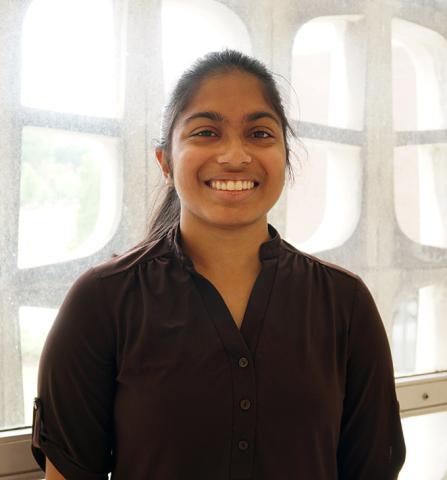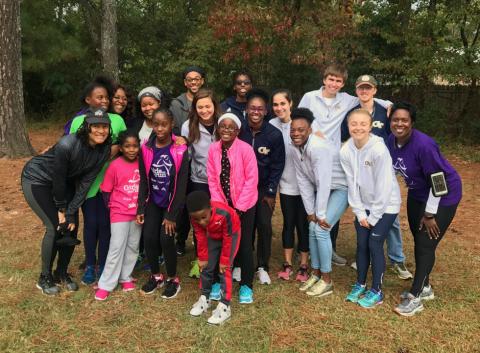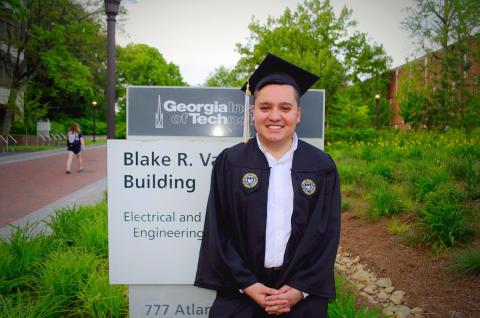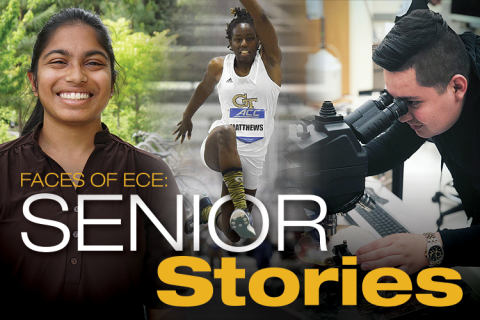This spring, 205 electrical and computer engineering seniors will graduate and join the more than 29,000 alumni worldwide from the School of Electrical and Computer Engineering. Here are three of their stories.
This spring, 205 electrical and computer engineering seniors will graduate and join the more than 29,000 alumni worldwide from the Georgia Institute of Technology's School of Electrical and Computer Engineering. Here are three of their stories.
Neha Tibrewal
Since the age of three, computer engineering major Neha Tibrewal has called the Bay Area home. Spending her formative years in San Jose, she was influenced by the close proximity to tech giants like Apple and Google. She grew up with frequent visits to the Intel Museum, drove past the Adobe headquarters every day, and went on school field tips to tech company headquarters.
Growing up in Silicon Valley and surrounded by engineers, it’s no surprise that Tibrewal gravitated toward science, technology, engineering, and math (S.T.E.M.). She joined the robotics team during her freshman year of high school and helped grow the team from six people to over 40. A love for tinkering and taking things apart in order to understand the way they worked cemented her path toward engineering.
As for her choice to come to Georgia Tech, she wanted to see what life was like on the other side of the country. Georgia Tech appealed to her because of its student community and culture.
“It doesn’t feel like a tech school. It’s not cutthroat at all. If someone knows something, everyone knows something. It doesn’t take long for knowledge to propagate. No one is out to get you; everyone wants you to succeed,” Tibrewal said.
Not only did Tibrewal go all the way across the country for school, but she ventured even further afield when she chose to study in one of Georgia Tech’s many study abroad programs in the summer of her first year. The nine weeks she spent in Tianjin, Shenzhen, and Shanghai, China was a stand-out experience during her time at Georgia Tech. She bonded with the group of 40 students who were part of the program and continues to go on travel adventures with many of them. Most recently, the crew visited Cuba for Spring Break.
She also did an internship at Facebook last summer in the Release To Production (RTP) Storage Team. Her work with the RTP team involved a focus on the storage infrastructure at Facebook and making sure all of the hardware worked correctly and was easy to use and repair. “We’re the ones who make sure you get reliable access to your cat videos,” she jokes.
On the last day of her internship, Facebook offered her a full-time job as a hardware systems engineer with the same team.
“Georgia Tech teaches you how to learn on the fly, which works well for a fast-paced environment like Facebook,” she said.
Starting in August, Tibrewal will move back in with her parents and will take a daily shuttle provided by Facebook to and from her office at Menlo Park.
“It might be a few years before I live on my own, but I always assumed I’d come back to the Bay Area someday,” Tibrewal said. “It’s where all the jobs I would want are located, plus it’s home.”
Bria Matthews
Inspired by her older sister, Bria Matthews decided to try track and field in middle school and adopted her sister’s main event, the triple jump, as her own. Along the way, her decision to study engineering was encouraged by another role model: her high school track coach.
“My math teacher junior year was also my track coach. He was actually the one who helped me decide to study engineering,” Matthews said. “I was leaning toward computer science, but he suggested engineering because it would give me more job opportunities.”
The Forest Park, Georgia native was recruited to come to Georgia Tech for track and field. Her participation requires at least two hours of practice each day in addition to lots of meets and competitions. Matthews, who also competes in the long jump and sprint, says that track and field, and sports in general, correlate well to her academic career.
“You learn to do things like performing well under stress, increasing endurance, practicing and visualization. Nothing is ever too much. Like that one extra run at the end of practice, you think, ‘I can’t do this,’ but you do it anyway. It’s all very similar to the pressures you face as a student and these skills help you persevere in your studies,” she said.
Matthews, who started as a computer engineering major, eventually switched to electrical engineering because she preferred working on hardware projects, particularly in the area of systems and controls and power and energy. As a part of the Opportunity Research Scholars Program’s Haiti Relay team, Matthews and her team built devices that use solar energy to power lights and charge cell phones for villagers in remote parts of Haiti.
“I like projects that allow me to get my hands dirty and also help people at the same time,” Matthews said.
Matthews also gives back by volunteering with the non-profit organization Girls on the Run. The organization inspires middle school girls to be confident and healthy through experience-based curriculum that integrates running games. The program culminates in a 5K, providing a tangible sense of achievement and the fulfillment of a goal.
“Working with Girls on the Run has rounded out my experience by allowing me to give back a little of what I’ve learned to kids who could one day end up on a collegiate track team. I think me being there and encouraging them to keep going when things are hard can go a long way, because I was in their shoes,” Matthews said.
Upon graduation, Matthews will be staying on to complete a master’s degree through the joint B.S./M.S. degree program. She will also continue competing with the Georgia Tech track and field team and striving to beat her personal best in the triple jump.
Sebastian Fernandez
Sebastian Fernandez comes from a family of engineers. His grandfather was a chemical engineering professor at the Universidad Nacional de San Antonio Abad del Cusco in Cusco, Peru. His father studied software engineering at UT Austin. At the age of two, his family emigrated from Peru to the U.S. and settled in San Diego, California before eventually moving to Alpharetta, Georgia. Much of the electrical engineering major’s experience of his native country was through the lens of an American when he came back to visit family and friends.
Besides being influenced by his father and grandfather, Fernandez gravitated toward engineering for even more personal reasons. He remembers visiting his grandfather and understanding the burden of unreliable electricity. Hot water was a luxury and the simple task of making breakfast required a two-mile walk to get gasoline for the stove.
“It was such a different experience from my own--all that hassle just to fry an egg. I perhaps naively thought, ‘I’ll go to Tech, study electrical engineering, and do something about this problem,’” Fernandez said.
That desire fueled an early interest in academic research. While programs like Opportunity Research Scholars (ORS) and Vertically Integrated Projects (VIP) are designed to give ECE students an undergraduate research experience, Fernandez took a less traditional route. He admired the work being done in Professor John Cressler’s lab with state-of-the-art Silicon-Germanium Heterojunction Bipolar Transistors, but Professor Cressler wasn’t participating in ORS or VIP.
Fernandez approached him and asked if he could join his lab as an undergraduate. Cressler agreed and Fernandez has worked there for the past two years gaining a tailor-made experience that aligns with his future interests. While working in the Silicon-Germanium Devices and Circuits Lab, his interest shifted from power and energy to semiconductor devices.
This fall, Fernandez will enter the electrical engineering Ph.D. program at Stanford University fully funded as a Stanford Graduate Fellow in Science and Engineering. He will work with Professor Eric Pop who is conducting bleeding-edge research on energy-efficient transistors made up of 2D materials within the field of device physics and nanotechnology.
“The work I will do with Eric over the next five years will be looking at electronics from an energy perspective, so in a way, I’ve come full circle. The devices and transistors I create will have to do with energy efficiency and thermal management above anything else,” Fernandez said.
Fernandez says that his grandfather groomed him from a young age to use his talents “for good, not greed.” Once he earns his Ph.D., he plans to follow in his footsteps and become a professor, too.
Additional Images



